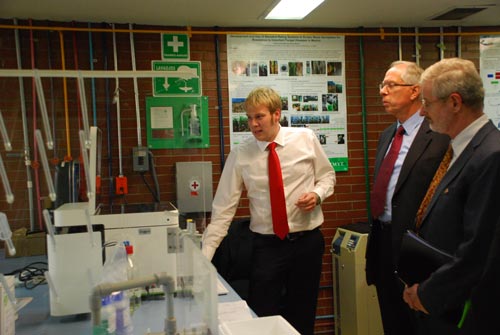CIMMYT has received a new flow cytometer that will  allow speedy DNA analysis for breeding. “With this new technology, we save tremendous amounts of money, time, and resources. We’re really grateful to Partec for this donation and to the German people for their support,” senior scientist George Mahuku thanked Edmund Duckwitz, German Ambassador to Mexico, and Hubertus von Römer, Science Attaché of the German Embassy, during their visit to CIMMYT on 18 December 2012. The German delegation officially handed over a new flow cytometer donated by Partec, a German biotechnology company, thus re-establishing a partnership that began in 1999 when Partec equipped a CIMMYT laboratory with a flow cytometer.
allow speedy DNA analysis for breeding. “With this new technology, we save tremendous amounts of money, time, and resources. We’re really grateful to Partec for this donation and to the German people for their support,” senior scientist George Mahuku thanked Edmund Duckwitz, German Ambassador to Mexico, and Hubertus von Römer, Science Attaché of the German Embassy, during their visit to CIMMYT on 18 December 2012. The German delegation officially handed over a new flow cytometer donated by Partec, a German biotechnology company, thus re-establishing a partnership that began in 1999 when Partec equipped a CIMMYT laboratory with a flow cytometer.
According to Mahuku, the new device will facilitate producing good hybrids to fight drought, heat, or diseases, such as the maize lethal necrosis disease in Eastern Africa. “We have identified some sources of resistance to this virus,” says Mahuku, “but we need to cross the sources into the appropriate background.” Finding the sources of resistance used to be a costly and lengthy process. “Before, we would plant two hectares, and after two or three weeks, we would find out that half of them weren’t desirable, so you’d have to chop them out. This wastes part of the investment in land preparation, the chemicals for treating, and the people planting all those things,” explained Mahuku. “With this equipment, we germinate the seeds and are able to analyze them within three days. Thus we plant only the desirable materials and save a month and a half of work.” CIMMYT director general Thomas Lumpkin added: “This instrument allows us to look at the blueprint of the plant, instead of waiting for the plant to grow.” The cytometer will ultimately benefit both maize and wheat research at CIMMYT.
The delegation had the opportunity to observe a demonstration of a quick DNA analysis using the Partec cytometer.
 Climate adaptation and mitigation
Climate adaptation and mitigation 